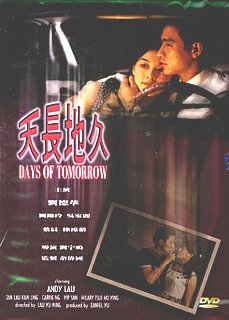Days of Tomorrow

Reviewed by YTSL
Over on the review section of the HKMDB site,
STSH wrote of this melodramatic offering -- that I had decided to view primarily
because it is one more work in which the often under-appreciated Carrie Ng
is known to have turned in an excellent performance -- that: “To survive
the first half, either be patient or use the fast-forward”! Although
I didn’t succumb to pressing the fast-forward button of my VCR even once,
I will admit to feeling antsy for at least the first half of this uncomic
Jeff Lau directed plus scriptwritten -- under the pseudonym of Kay On --
effort, and wondering whether that which looked good but seemed to have been
rather poorly edited would ever get going and not be quite so dull.

DAYS OF TOMORROW is initially set up as a story about a daughter’s quest
to learn about a father she had never seen (in anything other than photos)
and whom the woman who raised her refused to tell her all that much about.
Before too long, it is revealed that this man was a Tiu Ken Leung village
rebel who went from being a film extra and stuntman to be the star of a single
cinematic work: One that’s also -- and not coincidentally either --
entitled “Days of Tomorrow”. However, this flashback-filled movie doesn’t
really come to life until the rather mysterious man in question (Fung Tak
Shing comes in the form of Andy Lau) is revealed to have been in a situation
where he was loved -- or at least, lusted after -- by three very different
women (Ling -- AKA Lily -- is portrayed by Jan Lau, Nancy Mei Lan by Carrie
Ng and Sheung by Yip San).

This is not the fault of Hilary Tsui, the young actress who played Shing’s
curious offspring, Yan, and occupies the most screen-time early on in DAYS
OF TOMORROW. Rather, the further along the viewer ventures into the
story and world created by this movie’s makers, the more obvious it becomes
that the work’s true focus is on the relationships that certain individuals
who are of the generation that preceded the contemporary one had with one
another. On account of there needing to be an element of surprise for
the revelations re how they are connected with each other to be truly effective,
I don’t think I should disclose much more information re these personalities
besides it being the case that they all having some kind of connection with
the production of the first “Days of Tomorrow”.

Suffice to say in this review in terms of further plot description that two
of these individuals -- as opposed to just one -- turn out to be related
to Yan by way of biology, and that she comes across two more of the connected
characters when she takes a job as a production assistant on a proposed remake
of the film in which her father had a starring role. Here’s also divulging
that it appears to be from one of the latter -- along with a current resident
of Shing’s home village (one in which Chinese Nationalist flags were inexplicably
seen flying) -- that Yan learns most of the details of Shing’s life as well
as of the dramatic events that occurred on and around the troubled sets of
the first DAYS OF TOMORROW.

Should the reader starts questioning -- as I did -- how it is that certain
people could know so much about another person, so as to be able to paint
a full picture of what he was like prior to their meeting him and also during
those times that he was not in their company, the plot structure of DAYS
OF TOMORROW will be revealed as being rather flimsy, awkward and contrived.
The story’s credibility is not helped by there being no reason given as to
why the elderly film-maker known as Mr. Lui (who is essayed by Henry Fong
Ping) would suddenly decide, after the passing of a few decades, to remake
such an ill-fated work as that which could have made a star out of a young
upstart from the boonies (and thus set up a fortuitous -- for at least one
of them, anyways -- meeting between Yan and the wrinkled individual who used
to be quite the looker, especially when in full red lipsticked glory).

In all honesty, it would be quite easy to find many other faults with this
often truly artificial feeling as well as obviously flawed offering (in which
Deannie Yip and Chan Kwok Bong also briefly appear). Yet I really am
not lying when I state that DAYS OF TOMORROW actually -- against the odds
-- also does contain at least a couple of scenes -- both of which take place
near the end of the movie -- that managed to have quite an emotional impact
on this (re)viewer. As such, I will have to conclude that that whose
Chinese title of “Length of the Sky, Duration of the Earth” can apparently
be interpreted as “Enduring Loyalty in Love” is one work that most definitely
improves as it goes along (at least prior to what appears to have been an
unnecessarily tacked on epilogue).

My rating for this film: 5.5







